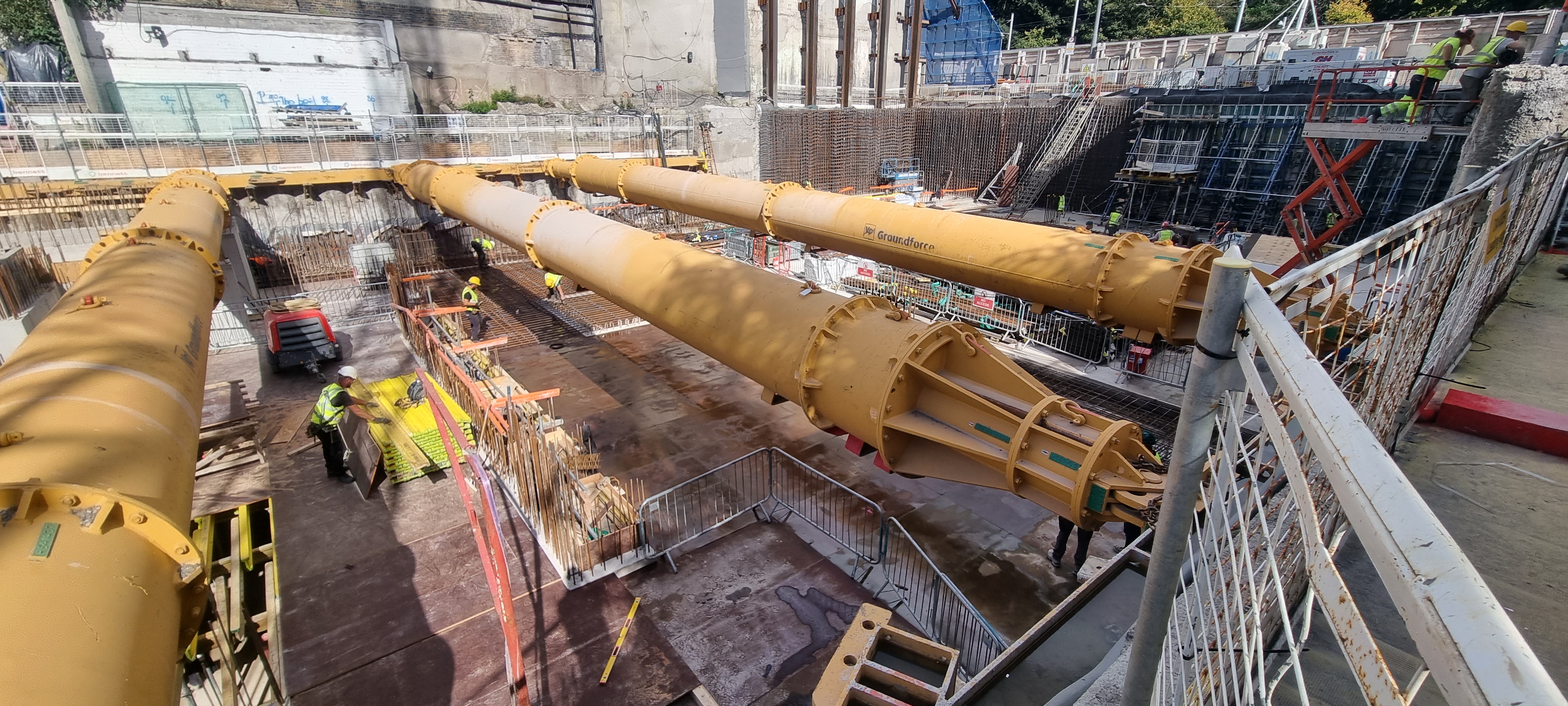Groundforce has supplied a bespoke support system for a major excavation in Dublin.
Contractor Bennett Construction is building a new eight-storey campus building in Dublin city centre for the Royal College of Surgeons in Ireland (RCSI).
Two of the building’s eight storeys are below ground, which means the site is currently occupied by a deep excavation more than 50m long and 30m wide.
Modular hydraulic equipment supplied by Groundforce is supporting the concrete secant-piled retaining wall while Bennett Construction completes the excavation and installs the reinforced concrete basement slab.
Although the excavation is roughly rectangular in plan, it includes several irregularities that complicate the engineering of the support solution. Lateral forces impose geotechnical loads varying between 215kNm and 300kN/m which are supported by Groundforce’s MP150 and MP250 hydraulic props via a waling beam comprising the company’s modular Mega Brace system.
However, where the shape of the excavation does not allow the use of standard equipment, bespoke beams and props have been designed and supplied to ensure that all of the concrete secant piles remain fully supported.
Five MP250 props support the middle of the excavation, spanning almost 30m. These props are fitted with 1,220mm-diameter ‘super-tube’ (twice the diameter of standard extension tubes) to increase stiffness and prevent deflection.
Each of the four corners of the excavation is supported by a combination of MP150 and MP250 props in lengths ranging from just over 5m to more than 18m. These props act as knee-braces, supporting the Mega Brace beam at angles of approximately 45o. This arrangement imposes a significant shear force on the retaining wall.
“At certain locations there are very short lengths of retaining wall comprising only a few piles and these are unable to resist the shear from the knee braces,” explains Groundforce major projects manager Adam Fletcher.

To enable the waling beam to resist the shear at these points, Groundforce designed bespoke steelwork that was welded to the Mega Brace beam in-situ.
“When the final pile layout was determined we decided to split the frame to suit two levels of propping and designed a bespoke corner brace to follow the pile line and limit the deflection where shear keys could not be used,” explains Adam.
Chiara Morena, Groundforce design manager, said: “In standard procedures, the props are located against the retaining wall using gallows brackets. These not only ensure the correct positioning of the prop but also carry its unsupported weight and prevent any risk of slippage. On this project, only the hard secant piles could be used for supporting the beam via gallows brackets and that was an additional challenge. Once a partial built wall was provided, we had to verify the anchored connection of the gallows brackets for each beam extension around the excavation.
“However, due to the difference in level in the RCSI excavation, one of the MP250 props is installed at a 3o angle to the horizontal which introduces an upward force at the higher end of the prop as it is braced against the waling beam. To counteract this, we installed an additional gallows bracket upside down, in non-standard fashion, above the prop at this point.”
Adam added: “Groundforce became involved when the design was at a very early stage and contributed to several revisions before the design was finalised, which also gave the opportunity to have a full picture of what was happening around the design. The bespoke solutions provided where the standard kit was not suitable are one of our strengths.”
Damien Watson, project manager with Bennett Construction, commented: “Groundforce provided continuous assistance after completing the design and during the installation and removal phases. They even helped with elements that fell outside their responsibility as a supplier of temporary propping equipment.”